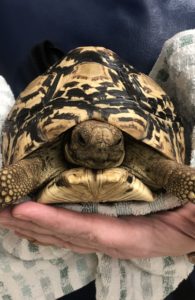 Not all pets are furry! We like scales too, and we are proud to provide care for reptile patients.
Not all pets are furry! We like scales too, and we are proud to provide care for reptile patients.
Common types: Bearded dragons, turtles, tortoises, snakes, & geckos
Diet: Varies A LOT per species
There are herbivorous, omnivorous, and carnivorous species. Knowledge of natural history or where an animal is originally found and how it would live in the wild are key to getting good health. Variety is key!
Housing: Provide as large a cage/enclosure as you can manage. If they are kept outdoors, a predator-free enclosure with appropriate access to shade for temperature regulation is required. Regular cleaning is necessary and substrate requirements vary from species-to-species.
External sources of heat to achieve a temperature gradient within an enclosure is VITAL for all reptiles, which regulate their body temperatures from their environment. We need to provide them access to all temperatures ranging from a basking spot to room temperature or cooler so that they can move to the area most comfortable for them at any given time. You’ll need at least 2 high quality thermometers for keeping any reptile.
Again, natural history determines the ranges recommended for each species.
Lighting: UVB light is a necessity for all herbivorous reptiles and recommended for most all reptiles kept in captivity. This UVB lighting lets them absorb calcium. Without it, they can develop metabolic bone disease (MBD) where their bones get soft and break easily.
Humidity is also VERY PARTICULAR and needs to be managed/measured with use of a hygrometer.
Common health problems:
NUTRITIONAL & HUSBANDRY problems are number one issue we see. Diets high in fat and low in variety, along with inadequate calcium and Vitamin D3 commonly cause metabolic bone disease, obesity, skin problems, and death.
PARASITES, both internal and external, are very common. Have any new addition to your home examined before it’s introduced to any other pets.
ABOVE ALL: Research the individual needs of a pet well before getting one. You can always call us to consult about what type of reptile may be best given your living situation BEFORE you get one. A new pet exam is recommended for all of these scaled friends so we can identify and head off problems before they start.
